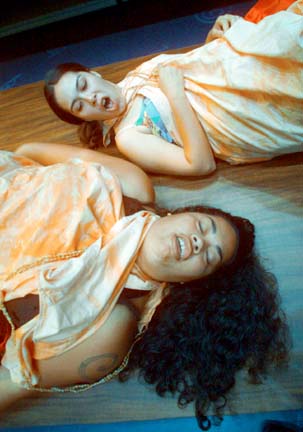


TAMMY Haili'opua Baker's "Kupua" shares two traditional Hawaiian stories about supernatural entities able to assume human form. Both tales are entertaining as bawdy physical comedy but very little of the underlying culture is made accessible to anyone who isn't already familiar with it. Culture club blues
'Kupua' delightful if
you know the lingoBaker and director Harry Wong III seem to have assumed that most people likely to be interested in seeing "Kupua" in its world premiere run at Kumu Kahua understand conversational Hawaiian and are familiar with local English slang as well. Kumu Kahua traditionally provides little or no cultural information in its playbills and leaves the audience to deduce what it can from the context in which words or phrases are used. Considering the importance of preserving and sharing knowledge of Hawaiian culture, this would have been a good time to reconsider that policy and provide a separate sheet of information in the playbill.
However, taken simply as a bawdy physical comedy with a Hawaiian setting, "Kupua" is slow-moving in places but hilariously entertaining over all.
Director Wong gets superb comic performances from each cast member. Their characterizations are generally so exaggerated that the comic content of the performances becomes more important than plot or the cultural context.
In "Ka 'Enuhe (The Caterpillar)," young Waipuna (Nara Malia Mio Springer) can't understand why her loutish self-centered husband, Kumuhea (Ed Kala Duncan), sleeps all day and has no energy for anything -- not even a complete sex act. Waipuna has to go to her mother's house to get something to eat but tells Mom (Kameha'ililani Waiau) that everything is maika'i (good) with the marriage.
Eventually two male hula dancers appear. Kumuhea dances with them and the three men become a single six-legged figure that crawls over to the Ewa end of the performance area and trashes the crops there. Duncan and his cohorts -- Squire F. Coldwell and Ely Wyatt Na Ka Ulu 'Aina Rapoza -- display strength and acrobatic skill in creating the caterpillar. Their hula parodies incorporate a variety of modern African-American dances and a bit of Frank DeLima material with good comic effect.
Waipuna and her mother eventually figure things out. Mom uses two pu'ili (split bamboo rattles) as weapons and either kills or drives away Kumuhea and his friends.
Several things remain ambiguous. Was Kumuhea a kupua all along or was he somehow bewitched by the other two? If he was a kupua before Waipuna married him, wouldn't she have noticed his sleeping habits?
Baker's second tale, "Ka Puhi a me Ka Loli (The Eel and the Sea Cucumber)," starts off slowly but quickly picks up momentum. It is the bawdier and more explicit of the two.
Sisters 'Anapau (Springer) and Kilipue (Waiau) go to the beach each night but return in the morning with no fish in their white plastic buckets. Why? Because they spend the night having sex with mysterious hula dancers Kapuhi (Rapoza) and Kaloli (Coldwell).
It takes awhile but their father, Ka'upena (Duncan) eventually realizes that his girls have been seduced by evil kupua. Cultural information in the playbill would have been valuable in clarifying why Ka'upena's revenge requires the various procedures that follow, but as with "Ka 'Enuhe," the comic action of the story takes precedence over the cultural context and the battle is an entertaining one.
The sex scenes involve no nudity but are choreographed to leave no doubt which sex acts are being performed, and the two pairs of lovers don't lack imagination regarding positions. Springer and Waiau vocalize with an enthusiasm comparable to that of Meg Ryan in "When Harry Met Sally."
Duncan delivers an outstanding comic performance as the befuddled and belligerent father. His asides to the audience add another dimension to the show for those seated close enough to hear them. Springer and Waiau contribute convincing over-the-top performances as dithering stereotypical titas in the theatrical style popularized by Lisa Matsumoto and Lee Cataluna. Rapoza and Coldwell play perfectly as handsome seductive kupua.
Playwright Baker's effective use of clever rapid-fire double entendres also adds comic impact to several scenes.
Storm Stafford (set design) provides a beautiful multi-level performance area for this in-the-round production. It doesn't take much imagination to interpret the structure as a large sea turtle "swimming' toward the Ewa side of the theater.
BullDog shares some interesting ideas in his debut as costume designer. The characters wear a hodge-podge of garments that suggest a convergence of several eras. For instance, the men in "Ka 'Enuhe" wear strips of bright green cloth, presumably representing the malo, or loin cloth, over their baggy aloha-print surfer shorts. Springer and Waiau likewise wear several layers of cloth that represent no single period.
Baker and Wong add another interesting element to the experience by having Monica K. Cho provide acoustic accompaniment with traditional Hawaiian musical instruments.
On stage: Kupua: Two Traditional Hawaiian Stories of Shape-Shifters": Review
Place: Continues at Kumu Kahua Theatre 8 p.m. Thursdays, Fridays and Saturdays, and 2 p.m. Sundays through April 15.
Call: 536-4441
Cost: 12 to $15 general; $10 to $12 for seniors; and $5 to $10 for students.
Click for online
calendars and events.